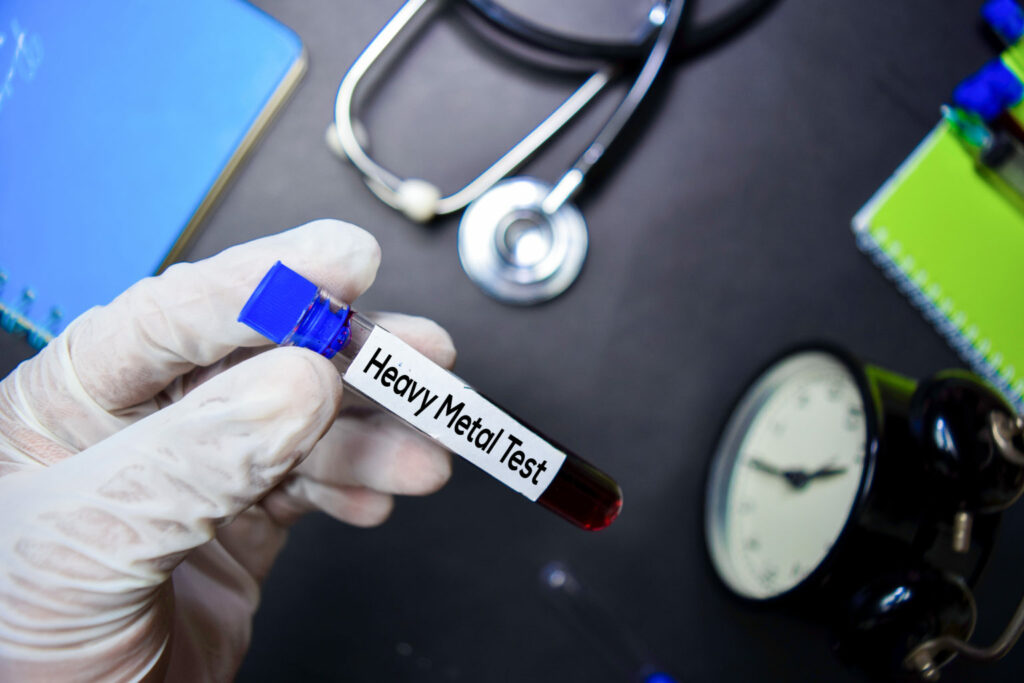Heavy Metal Toxicity Test
Heavy Metal Toxicity Test
Health Check-Up at IntelliHealthPlus Clinic, Bangkok
A Heavy Metal Toxicity Test is a diagnostic procedure used to assess the presence and levels of toxic heavy metals in the body. Heavy metals are elements with high atomic weights that can accumulate in the body over time and cause adverse health effects. Examples of toxic heavy metals include lead, mercury, cadmium, arsenic, and aluminum.
Heavy metal toxicity tests are important because prolonged exposure to these substances can lead to various health problems. Heavy metals can adversely affect multiple organs and systems in the body, including the nervous system, cardiovascular system, kidneys, liver, and immune system. Symptoms of heavy metal toxicity can range from mild to severe and may include fatigue, cognitive impairment, neurological disorders, digestive issues, respiratory problems, and compromised immune function.
By detecting and quantifying heavy metal levels, healthcare professionals can evaluate the potential health risks associated with heavy metal exposure.
What is Included in a Heavy Metal Toxicity Testing?
A Heavy Metal Toxicity Test involves the collection and analysis of a blood sample to assess the levels of toxic heavy metals in the body. The procedure begins with the collection of a small amount of blood, typically drawn from a vein in the arm. The blood sample is then sent to a laboratory for analysis.
In the laboratory, the blood sample is subjected to various techniques, such as Inductively Coupled Plasma Mass Spectrometry (ICP-MS) or Atomic Absorption Spectrometry (AAS), which can accurately measure the concentration of specific heavy metals in the blood. These techniques allow for the detection and quantification of heavy metals like lead, mercury, arsenic, cadmium, and others.
The test results provide valuable information about the levels of toxic heavy metals present in the bloodstream, indicating the extent of exposure and potential health risks. Healthcare professionals can interpret the results and assess if the heavy metal levels exceed safe thresholds. This information helps guide further evaluation, diagnosis, and development of appropriate treatment plans to address heavy metal toxicity and minimize associated health complications
What metals do they look for in a Heavy Metal Toxicity Testing?
Lead exposure can occur through sources like contaminated water, lead-based paints, or certain occupations. High levels of lead in the body can lead to neurological, developmental, and behavioral issues.
Mercury exposure can result from consuming contaminated seafood or through dental amalgam fillings. Mercury toxicity can affect the nervous system, kidneys, and cardiovascular system.
Arsenic can be found in drinking water, certain foods, or occupational exposure. Prolonged exposure to arsenic can lead to various health problems, including skin issues, respiratory difficulties, and an increased risk of certain cancers.
Cadmium exposure can occur through contaminated food, tobacco smoke, or occupational exposure. High levels of cadmium can have detrimental effects on the kidneys, lungs, and bones.
Although aluminum is naturally present in the environment, excessive exposure to aluminum can occur through certain medications, cookware, or industrial processes. High levels of aluminum may have implications for neurological health.
These are some of the commonly tested heavy metals in a Heavy Metal Toxicity Test. However, depending on specific circumstances, other metals like nickel, copper, chromium, or others may also be included in the test panel. The selection of metals to test for may vary based on individual symptoms, exposure history, and suspected sources of heavy metal toxicity.
Benefits of Heavy Metal Toxicity Testing:
Heavy Metal Toxicity Testing is an important screening tool for individuals who may have been exposed to toxic metals in their environment or occupation. The test results can help identify any elevated levels of heavy metals in the body and determine the appropriate course of treatment to eliminate them.
Some of the potential benefits of Heavy Metal Toxicity Testing include early detection and prevention of toxic metal-related illnesses, reduced risk of chronic diseases such as cancer, improved cognitive function and neurological health, and increased overall wellness and quality of life. The test results can also help guide dietary and lifestyle changes to reduce exposure to toxic metals and support the body’s natural detoxification processes.
Undetected heavy metal toxicity can lead to a wide range of symptoms and health issues, including neurological disorders, kidney damage, cardiovascular disease, and even cancer. Heavy metals can accumulate in the body over time and can be difficult to remove without medical intervention. Therefore, it is important to get tested to ensure early detection and treatment if necessary.
Here are some examples of individuals who may benefit from a Heavy Metal Toxicity Test:
Several individuals can benefit from having a Heavy Metal Toxicity Test, especially those who may have increased risk factors or symptoms associated with heavy metal exposure. The following groups of people can particularly benefit from this test:
- Workers in occupations with high exposure to heavy metals, such as miners, welders, battery manufacturers, and metal foundry workers, are at an increased risk of heavy metal exposure and can benefit from regular monitoring of their heavy metal levels.
- Consuming large amounts of seafood, particularly fish known to be high in mercury, can also lead to elevated levels of heavy metals in the body. Testing can help assess the extent of exposure and guide individuals in making informed decisions about their seafood consumption.
- Individuals who have undergone certain medical treatments or procedures that involve exposure to heavy metals, such as chemotherapy or the use of metal-containing implants, may want to monitor their heavy metal levels to ensure there is no excessive accumulation or toxicity.
- Individuals with unexplained symptoms that align with heavy metal toxicity, such as fatigue, cognitive difficulties, or gastrointestinal distress, a Heavy Metal Toxicity Test can help identify if heavy metals are contributing to their health issues. This information can guide further investigation and appropriate treatment.
Symptoms of Heavy Metal Toxicity:
Heavy metal toxicity can manifest with a wide range of symptoms that can vary depending on the specific heavy metal involved, the duration and level of exposure, and individual susceptibility. Some common symptoms associated with heavy metal toxicity include:
Persistent fatigue and lack of energy are common symptoms observed in heavy metal toxicity. Individuals may experience a general feeling of tiredness or weakness that does not improve with rest.
Heavy metals can affect the nervous system and lead to various neurological symptoms. These may include brain fog, difficulty concentrating, memory problems, irritability, mood changes, headaches, tremors, numbness or tingling sensations in the extremities, and even more severe neurological disorders in cases of prolonged or high-level exposure.
Heavy metal toxicity can affect the digestive system and result in gastrointestinal symptoms such as abdominal pain, nausea, vomiting, diarrhea, or constipation.
Exposure to certain heavy metals like lead or cadmium can lead to respiratory issues such as shortness of breath, coughing, wheezing, or pulmonary irritation.
Heavy metal toxicity may contribute to skin problems such as rashes, eczema, dermatitis, or other allergic reactions.
Some heavy metals, including lead and mercury, can impact the cardiovascular system. Symptoms may include high blood pressure, rapid heart rate, chest pain, or palpitations.
Heavy metals like lead, cadmium, or mercury can affect kidney function and contribute to kidney damage. This may result in changes in urine output, increased thirst, or swelling in the extremities.
Heavy metal toxicity can impact reproductive health and fertility in both men and women. It may lead to menstrual irregularities, hormonal imbalances, decreased sperm quality, or difficulties conceiving.
Common Causes of Heavy Metal Toxicity:
Heavy metal toxicity can occur due to various sources of exposure. Some common causes of heavy metal toxicity include:
Certain occupations involve working with heavy metals or in environments where heavy metals are present. Examples include miners, welders, battery manufacturers, metal foundry workers, painters, and construction workers. Prolonged exposure to heavy metals in these occupations can lead to accumulation and toxicity.
Individuals living in areas with high environmental contamination, such as proximity to industrial sites, waste disposal areas, or polluted water sources, may be at an increased risk of heavy metal exposure. Environmental pollution from industrial emissions, mining activities, or improper waste disposal can contaminate air, water, and soil with heavy metals.
Consumption of contaminated food and water is a significant source of heavy metal exposure. Seafood, especially large predatory fish like tuna and swordfish, can contain high levels of mercury. Additionally, heavy metals like lead, cadmium, and arsenic can contaminate crops and drinking water through soil or water pollution, agricultural practices, or industrial runoff.
Some dental materials, such as amalgam fillings containing mercury, can contribute to heavy metal exposure. Over time, mercury vapor can be released from these fillings, potentially leading to increased levels of mercury in the body.
Some medications and treatments may contain heavy metals or lead to heavy metal accumulation in the body. Examples include certain herbal remedies, traditional medicines, some chemotherapy drugs, and certain metal-containing implants or devices.
Exposure to heavy metals can also occur through the use of certain home and consumer products. Lead-based paints, contaminated cosmetics, traditional or folk remedies, ceramic cookware with lead glazes, and contaminated toys or jewelry can be sources of heavy metal exposure.
It’s important to note that heavy metal toxicity can occur due to a combination of factors, and the specific sources may vary depending on the individual’s circumstances and environment. Regular monitoring, awareness of potential sources of exposure, and taking appropriate precautions can help reduce the risk of heavy metal toxicity.
Who should get a Heavy Metal Toxicity Test?
A Heavy Metal Toxicity Test is recommended for individuals who have been exposed to heavy metals due to their occupation, hobbies, or living environment. It is also recommended for those who exhibit symptoms of heavy metal toxicity or have a history of heavy metal exposure.
Frequently Asked Questions:
What is a heavy metal toxicity test?
What are the common metals tested for in a heavy metal toxicity test?
What are the symptoms of heavy metal toxicity?
How can heavy metal toxicity be treated?
Why Us..
Health Check-Ups at IntelliHealthPlus Clinic By StemCells21
FREE CONSULTATION
Fast Track
1-2 Days Test Results
Health Check-ups at IntelliHealth+
At IntelliHealthplus Clinic, we believe in the importance of proactive healthcare and empowering our patients to take control of their health.
Our health check-up package provides valuable insights into your health status, and our team of experienced physicians will work with you to develop a personalized plan to optimize your health and well-being.
In our practice we apply evidence-based methods that have been practiced and refined for over 10 years in our operations, offering advanced techniques for treating various conditions.
If you would like to find out more or speak to one of our specialist contact us today to book your FREE consultation.
Book a FREE Consultation Now
IH+ Contact Form
Contact our international team of medical professionals with language services available in English, Thai, Arabic, Chinese, Spanish, and Russian.
Please indicate your preferred language and we will do our best to accommodate your request.


